On December 17 we Orthodox honor four Old Testament men of faith: the Prophet Daniel and the Young Men Ananias, Azarias and Mishael, also known as Shadrach, Meshach and Abednego, and sometimes called the Three Holy Children.
This is a great story. I learned it in Protestant summer Bible School, but I wonder how many Orthodox know it. We sing of them on the Sunday before the Nativity of Christ, and every seven years or so their feast falls on Sunday, but I wonder how many of our clergy tell the stories of the saints. (If not, what a great loss to our peoples’ sense of our heritage.)
Those few who come to Orthros hear bits and pieces of the Song of the Three Young Men during the usual Canon. And that – except for people who have actually read the Old Testament, and if you are one of them God bless you – is about it.
In this Post I’ll sum up and paraphrase a lot. You’ll do better to stop reading this and instead read the book of Daniel for yourself. It’s much livelier than what follows here – more “fun” even.
In Orthodox and Roman Catholic Bibles, the entire story is found in the book of the Prophet Daniel. However Anglicans and Protestants put part of the account of the Three Young Men in the furnace in a separate section called “The Apocrypha”. * This is included in most Anglican Bibles but omitted from Protestant Bibles. One way to find it online: Google “Bible Gateway Song of the Three Holy Children”.
- Aprocyphal: “of doubtful authenticity, although widely circulated as being true”
The Babylonian Captivity
These Four were among those exiled after King 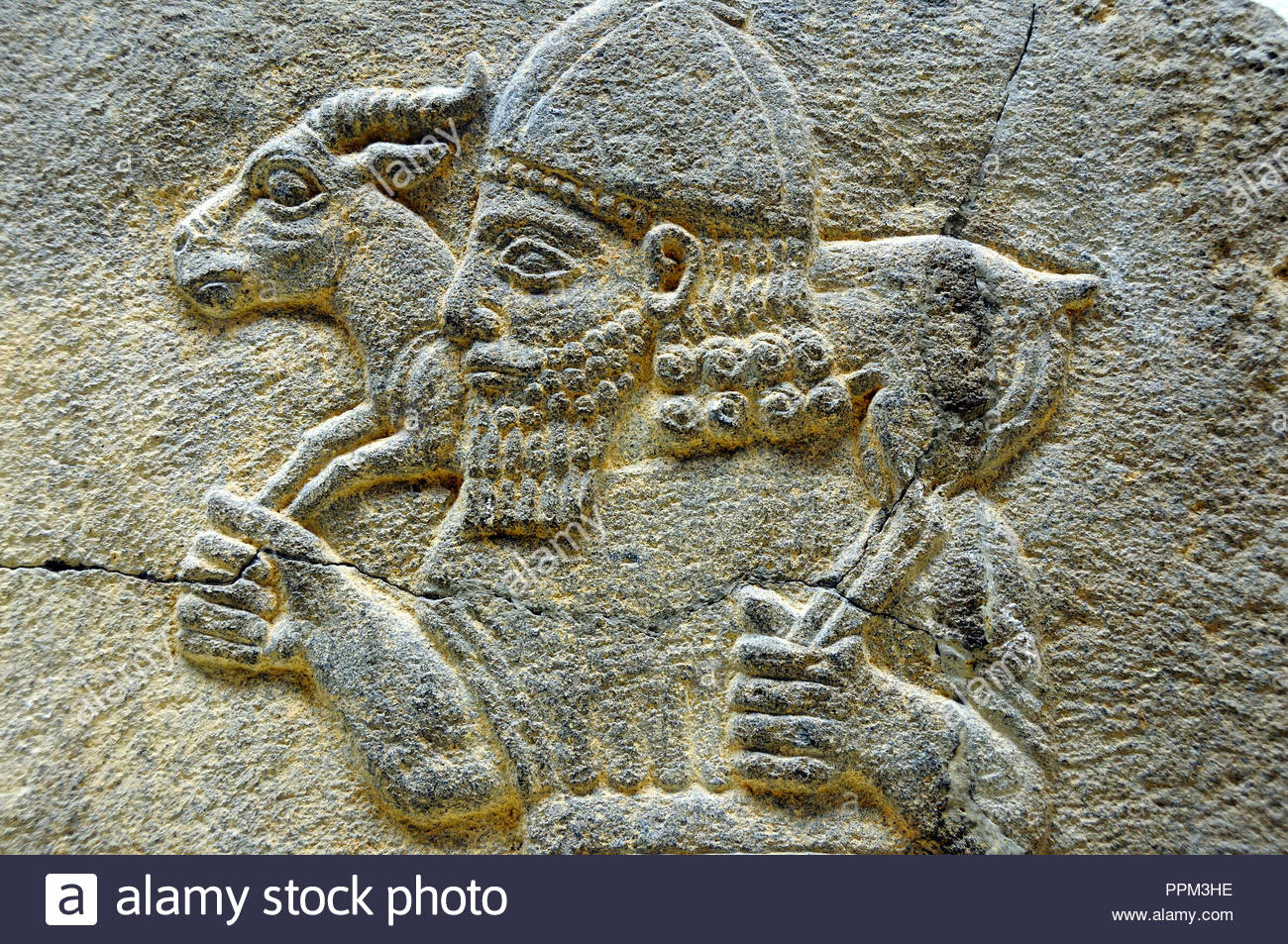 Nebuchadnezzar of Babylon (from part of present day southern Iraq) had conquered and leveled Jerusalem and marched the “intelligentsia” and “capable” (like Daniel and the Three Young Men) off to Babylon for seventy five years in Exile. The temple likewise was destroyed, and the Babylonians carried the sacred vessels back to Babylon. This was in the sixth century BC.
Nebuchadnezzar of Babylon (from part of present day southern Iraq) had conquered and leveled Jerusalem and marched the “intelligentsia” and “capable” (like Daniel and the Three Young Men) off to Babylon for seventy five years in Exile. The temple likewise was destroyed, and the Babylonians carried the sacred vessels back to Babylon. This was in the sixth century BC.
King Nebuchadnezzar perceived that some of the Jews could be useful to him, so he brought Daniel, Ananias, Azarias and Mishael to his court. They proved “ten times wiser” than all the wise men and astrologers of the Babylonian court. He even gave them Babylonian names. Daniel he called Beltashazer. The others became Shadrach, Meshach and Abednego. In the book of Daniel usage goes back and forth, so if you read it stay alert.
This video is kind of cute, not to mention educational:
How Daniel and the Three Young Men “got ahead” in Babylon
Now, Nebuchadnezzar began to have strange troubling dreams, so he asked his wise men to interpret them. They said Tell us the dream. No, the King replied, If you’re so wise, first you tell me my dream or I will cut you in pieces and burn your houses down. (Nebuchadnezzar was kind of tough.) We cannot! they cried. But then, just as the King was about to send them away to their fate, they said: But, your majesty, we know a man among the Hebrews who can – Daniel.
So he had Daniel brought to him. Daniel said: 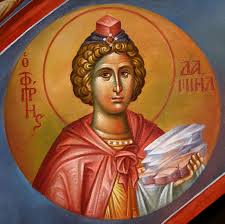 Yes, your majesty, I can do so – not because I am wise but because my God has revealed it to me. This, O King, was your dream: And he described a great statue representing Nebuchadnezzar’s kingdom along with empires yet to come. All of it will be destroyed, Daniel said, till finally the God of heaven will bring from it a stone “uncut by hands”, which will become a Kingdom which will never be destroyed. The dream is certain and its interpretation sure.
Yes, your majesty, I can do so – not because I am wise but because my God has revealed it to me. This, O King, was your dream: And he described a great statue representing Nebuchadnezzar’s kingdom along with empires yet to come. All of it will be destroyed, Daniel said, till finally the God of heaven will bring from it a stone “uncut by hands”, which will become a Kingdom which will never be destroyed. The dream is certain and its interpretation sure.
The King bowed low before Daniel and set him and the Three Young Men as governors in Babylon.
The Three Young Men in the Burning Fiery Furnace
Later Nebuchadnezzar had a huge gold statue set up and commanded the people, “When you hear the sound of the horn, flute, harp, lyre, bagpipe and psaltery and all kinds of music, you shall fall down and worship the golden image”. *
- This story is much better in the original text, but I won’t quote it all here because it repeats much and goes on forever. This passage is read at our Holy Saturday morning Liturgy. The first year we at Saint Nicholas, Cedarburg, were Orthodox I, a neophyte, didn’t yet know that “horn, flute, harp, lyre” and so on is repeated many times. I assigned a catechumen to read the passage. Second time through the “horn, flute…”, he got the giggles, and then when he came to it again the rest of us fell apart, and we had to take time to recover ourselves. Was this irreverent on our part? I don’t think so. It sounds like it was written as it was to be “entertaining”, shall we say? I can just hear Jewish children repeating the same “horn, flute, harp” parts along with the reader, and laughing in delight. We always remember our reader at our Holy Saturday Liturgy. Memory eternal, Gunther.
So the King built a great fiery furnace and commanded that any who refused to worship the idol should be cast into it. Shadrach, Meshach and Abednego refused and said to Nebuchadnezzar: “O King, our God whom we serve is able to deliver us from the burning fiery furnace… But if not, let it be known to you, O King, that we do not serve your gods, nor will we worship the golden image which you have set up.”
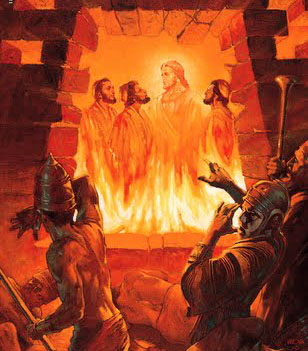 Nebuchadnezzar was furious and had the furnace heated seven times more than before, so that even his servants were burnt to death when they approached it. The Three Young Men were cast into the fire. But an angel of the Lord, “one like a Son of Man”, came and surrounded them with something like a whirlwind of cooling mist.
Nebuchadnezzar was furious and had the furnace heated seven times more than before, so that even his servants were burnt to death when they approached it. The Three Young Men were cast into the fire. But an angel of the Lord, “one like a Son of Man”, came and surrounded them with something like a whirlwind of cooling mist.
The following part of the story uses their Hebrew names. Protestants put it in their Apocrypha:
There Azariah prayed a long prayer of repentance which began:
Blessed art thou, O Lord, God of our fathers, and worthy of praise; and thy name is glorified for ever.
For thou art just in all that thou hast done to us, and all thy works are true and thy ways right, and all thy judgments are truth.
Thou hast executed true judgments in all that thou hast brought upon us and upon Jerusalem, the holy city of our fathers, for in truth and justice thou hast brought all this upon us because of our sins.
(Could our world today use more such prayer? instead of our self-justifying “We’re pure and innocent and guiltless; it’s all their fault.”)
Then the Three sang a long gorgeous hymn of praise, which as I said is part of our first celebration of Christ’s victory over hell. It begins:
“Bless the Lord, all you works of the Lord, sing praise to him and highly exalt him for ever.
Bless the Lord, you heavens, sing praise to him and highly exalt him for ever.
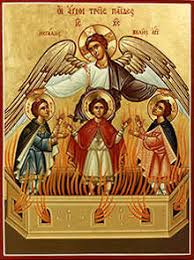 Bless the Lord, you angels of the Lord, sing praise to him and
Bless the Lord, you angels of the Lord, sing praise to him and
highly exalt him for ever.
Bless the Lord, all waters above the heavens, sing praise to him and highly exalt him for ever.
Bless the Lord, all powers, sing praise to him and highly exalt him for ever.
Bless the Lord, sun and moon, sing praise to him and highly exalt him for ever.
Bless the Lord, stars of heaven, sing praise to him and highly exalt him for ever.”
It concludes:
“Bless the Lord, Ananias Azariah, and Mishael, sing praise to him and highly exalt him for ever; for he has rescued us from Hades and saved us from the hand of death, and delivered us from the midst of the burning fiery furnace; from the midst of the fire he has delivered us.
Give thanks to the Lord, for he is good, for his mercy endures for ever.
Bless him, all who worship the Lord, the God of gods, sing praise to him and give thanks to him, for his mercy endures for ever.”
If you read nothing else from this story, please look up this hymn and sing it to yourself.
When they emerged not a hair of their head was touched nor was their clothing even singed. Can you see why we read this on Holy Saturday?
The King then decreed that all must worship the God of Shadrach, Meshach and Abednego, and if they didn’t “they will be cut in pieces and their houses destroyed.” (Nebuchadnezzar had a one track mind. I think this is probably not the best way of converting people to the Faith!)
The Orthodox Church has always identified with the Three Young Men. How often have Orthodox people been in the “burning fiery furnace” – persecuted first by the Jews, then the Great Persecution which was worse in the East, then by iconoclasts, and by Muslim Saracens, and Tartars and Mongols and Turks – and just short of persecution by Roman Catholics and (I’m sorry to say) in Alaska by Americans – and then worst of all by the Communists. Thank God that today by His grace most Orthodox are free to practice our Faith for now. For now. So here is the message of the story: God delivers his people out of all our trials, and He will again. So have faith! Have faith!
However, Nebuchadnezzar kept forgetting and went back to thinking he ruled the 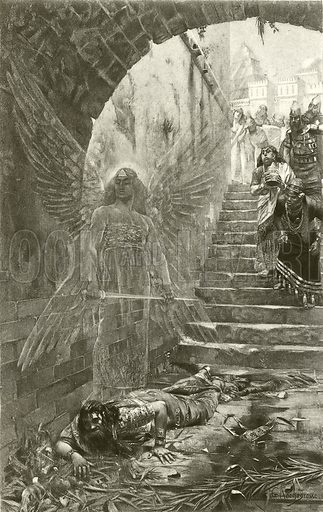 cosmos, so he had another terrifying dream. When he brought Daniel in to interpret it, Daniel hesitated to speak. But finally at the King’s urging (Nebuchadnezzar was rather good at “urging”, you may remember) he said, This is the interpretation. For a year you will go mad and live among the beasts of the field and feed on grass, till you learn that our God is ruler of all. Then you will be restored.
cosmos, so he had another terrifying dream. When he brought Daniel in to interpret it, Daniel hesitated to speak. But finally at the King’s urging (Nebuchadnezzar was rather good at “urging”, you may remember) he said, This is the interpretation. For a year you will go mad and live among the beasts of the field and feed on grass, till you learn that our God is ruler of all. Then you will be restored.
And so it happened just as Daniel had foreseen.
The Handwriting on the Wall
Nebuchadnezzar died. His son Belshazzar succeeded him, a man who had the same disposition as his father. In the palace he threw a great feast, and he and all his nobles feasted and drank from the sacred vessels taken from the temple in Jerusalem. Suddenly a man’s hand was seen writing on the wall the words “Mene Mene Tekel Upharsin”. (This, of course, is the origin of the foreboding phrase “handwriting on the wall”.)
The King was terrified, shook like a leaf. No one knew what it meant. It was in 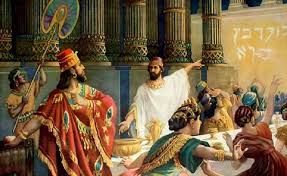 fact in Aramaic, the popular language of the Jews. So his Queen said: Call in Daniel of the Hebrews. Daniel said: O King, “This is the interpretation: MENE: God has numbered your kingdom, and finished it. TEKEL: You have been weighed in the balance and found wanting. UPHARSIN: Your kingdom has been divided and given to the Medes and Persians.” Despite the dreadful message Belzhazzar was so impressed that he made Daniel third in command in his Kingdom – which didn’t last long, for that very night the Medes invaded, the King was slain and Darius King of the Medes took his place.and
fact in Aramaic, the popular language of the Jews. So his Queen said: Call in Daniel of the Hebrews. Daniel said: O King, “This is the interpretation: MENE: God has numbered your kingdom, and finished it. TEKEL: You have been weighed in the balance and found wanting. UPHARSIN: Your kingdom has been divided and given to the Medes and Persians.” Despite the dreadful message Belzhazzar was so impressed that he made Daniel third in command in his Kingdom – which didn’t last long, for that very night the Medes invaded, the King was slain and Darius King of the Medes took his place.and
Daniel in the Lions’ Den
Now the most famous story of all. Darius was persuaded by his lords to issue this decree: Anyone who fails to worship you, O King, shall be cast into a den of lions. So the King issued the decree – then found out that Daniel whom he loved worshiped only the God of heaven. Darius tried to repeal the decree, but his lords reminded him: Remember O King, that no law of the Medes and the Persians may be revoked. (And this is the origin of the less common phrase “the law of the 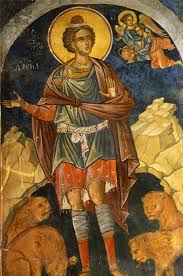 Medes and the Persians”. People who live by this unbending principle and are afraid to admit their mistakes often get themselves into a lot of trouble.) Darius was stuck. But Daniel had faith. The King told him “I trust that your God will deliver you”, and unwillingly sent him to the lion’s den.
Medes and the Persians”. People who live by this unbending principle and are afraid to admit their mistakes often get themselves into a lot of trouble.) Darius was stuck. But Daniel had faith. The King told him “I trust that your God will deliver you”, and unwillingly sent him to the lion’s den.
I love this icon. Lions beginning lower left clockwise: “I would never…” “Grr…mmm…” “Who, me?” “Ooh, this ankle would be so tasty!”
Darius was awake all night worrying and came to the lions’ den next morning crying out and lamenting, “Daniel, Daniel, has your God delivered you?” Sure enough, not a single lion had touched him. Again it was the faith of Daniel that God would deliver him.
Daniel’s Visions
Then Daniel had a series of visions and visitations from the Archangel Michael which almost did him in. He wrote that it took him days to recover from them. (Contact with the genuinely holy sometimes has that effect.) All seem to have been about the future of the nations of the ancient world.
Then came the last vision. (Much of this imagery is repeated in the Book of Revelation.) Daniel saw into the heights of heaven, to God the Father whom he calls the Ancient of days, being worshiped by thousands and tens of thousands: Then “I beheld one like the Son of Man coming with the clouds of heaven!” 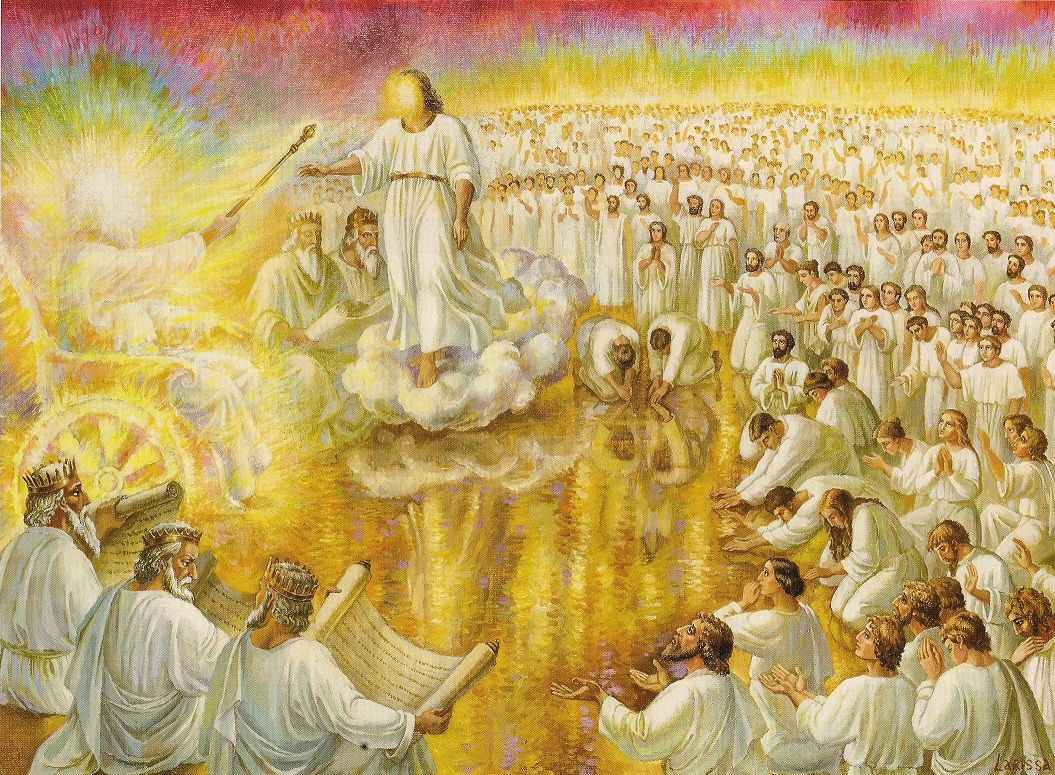
He was brought to the Ancient of Days, and “Then to Him was given dominion and glory and a kingdom, that all peoples, nations, and languages should serve Him. His dominion is an everlasting dominion, which shall not pass away, and His Kingdom the one which shall not be destroyed.”
Hear the words of the Archangel Gabriel to the Blessed Virgin 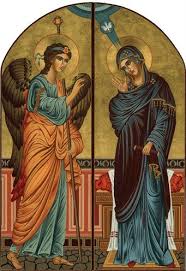 Mary: “Behold, you will conceive in your womb and bear a Son… He will be great, and will be called the Son of the Most High; and the Lord God will give Him the throne of His father David. And He will reign over the house of Jacob forever, and of His kingdom there will be no end.”
Mary: “Behold, you will conceive in your womb and bear a Son… He will be great, and will be called the Son of the Most High; and the Lord God will give Him the throne of His father David. And He will reign over the house of Jacob forever, and of His kingdom there will be no end.”
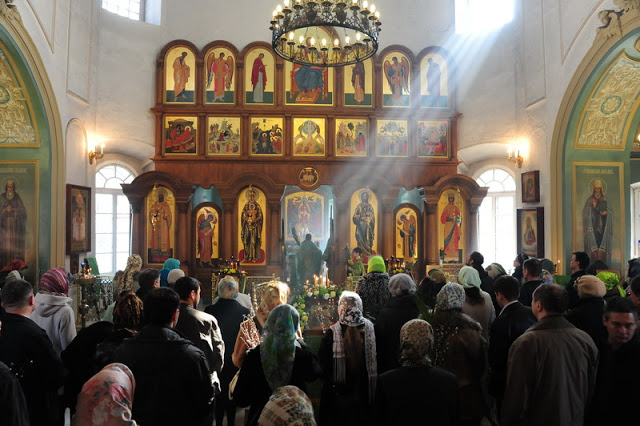 And the words which we recite at every Divine Liturgy: “And he shall come again with glory to judge the living and the dead, and His kingdom shall have no end.”
And the words which we recite at every Divine Liturgy: “And he shall come again with glory to judge the living and the dead, and His kingdom shall have no end.”
Next Week: The Hieromartyr Ignatios of Antioch
Week after Next: The Nativity of our Lord, God and Savior Jesus Christ
